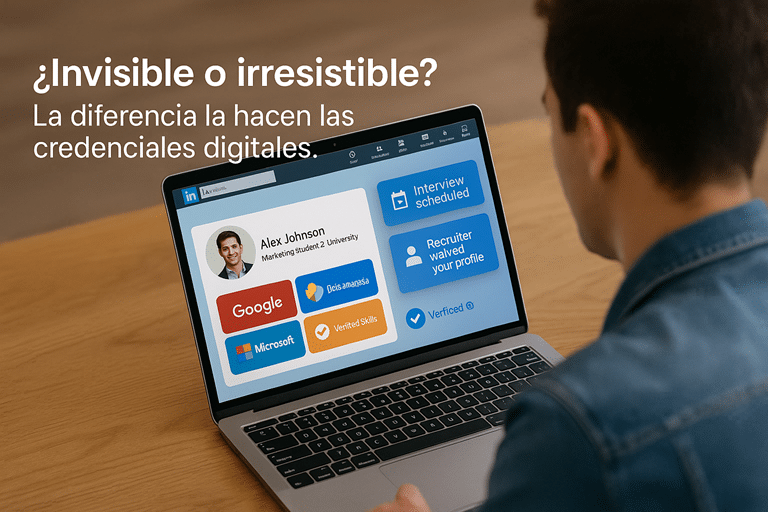The labour market is constantly evolving, driven by digitalisation and the need for specific and up-to-date skills. Faced with this scenario, Micro-credentials and blockchain technology have emerged as innovative tools that enable the development of skills demanded by employers. In this article, we will explore how these technologies are transforming education and providing flexible and secure solutions for people to improve their employability.
What are Micro-credentials and why are they important?
The Micro-credentials are learning recognitions that certify specific skills, providing a fast and demand-oriented alternative to employment. Unlike traditional education programs, which are often long and expensive, Micro-credentials allow students to obtain specific skills in a short period of time.
In a job market where technical and soft skills are changing rapidly, these credentials offer an efficient way for workers and students to demonstrate up-to-date knowledge. They can also focus on topics as varied as data analysis, cybersecurity, effective communication, or leadership.

How does Blockchain technology work in Micro-credential certification?
Blockchain technology, also known as block chain, is a tool that ensures transparency, authenticity and security in the certification of skills. By issuing a micro-credential on a blockchain-based platform, this information is guaranteed to be unalterable and verifiable, providing confidence to both employers and employees.
Advantages of Blockchain Technology for Micro-Credentials:
- Transparency and traceability: Data recorded on the blockchain can be publicly verified, allowing employers to confirm the authenticity of credentials without the need for intermediaries.

- Immutability: Once a Micro-credential is issued on the blockchain, it cannot be altered or manipulated, guaranteeing its authenticity over time.
- Portability: Micro-credentials on the blockchain are accessible to the user from anywhere, facilitating job mobility and international recognition.
Why today’s job market needs micro-credentials and blockchain?
Digitalization and globalization have created new demands in the workplace. Companies are increasingly looking for talent that not only has an academic background, but also has practical and up-to-date skills. Micro-credentials offer a fast and flexible way for workers to adapt to emerging needs.
Some reasons why companies are opting for candidates with blockchain-verifiable Micro-credentials:
- Reduction in recruitment time: Micro-credentials are an effective way to validate specific skills, allowing companies to reduce recruitment times.
- Reliability in skills certification: With blockchain, employers can be sure that certificates are authentic and that the candidate actually possesses the skills.
- Adaptability and continuous updating: Traditional programs can quickly become outdated. Micro-credentials allow professionals to stay current in areas such as data analysis, artificial intelligence, and software development, which require constant updating.
Examples of skills that can be certified with Micro-credentials in blockchain
As the job market becomes more competitive, skills specificity becomes a key differentiator. Micro-credentials, backed by blockchain, allow for certification of a variety of competencies that are highly valued by employers:
- Advanced technological skills: Certifications in cybersecurity, artificial intelligence, software development and data analysis are essential in the digital economy.
- Interpersonal skills: Skills such as leadership, teamwork, and communication are essential and easily verifiable through Micro-credentials.
- Sustainable skills: The green economy also demands skills in sustainability and environmental management, areas where micro-credentials allow people to demonstrate current and specialized knowledge.
Benefits for students, workers and employers
The adoption of micro-credentials and blockchain technology benefits all stakeholders involved. For students and workers, these technologies offer:
- Flexibility: They can study and certify skills at their own pace.
- Immediate recognition: Upon completion of training, students or employees receive an instantly verifiable certification.
- Labor mobility: Digital certification facilitates the recognition of skills in different regions and countries.
For employers, blockchain technology and micro-credentials represent an efficient way to verify specific competencies, reducing recruitment costs and improving the accuracy of talent selection.
Conclusion
Micro-credentials, powered by blockchain technology, are redefining the future of skills training, making education more accessible, relevant, and effective for today’s job market. These innovations not only facilitate continuous learning but also empower professionals to keep up with changing industry demands.
Are you interested in learning more about how to implement Micro-credentials and Blockchain Technology in your Institution? Write to us at info@acreditta.com.
Subscribe to blog here and receive all our content







